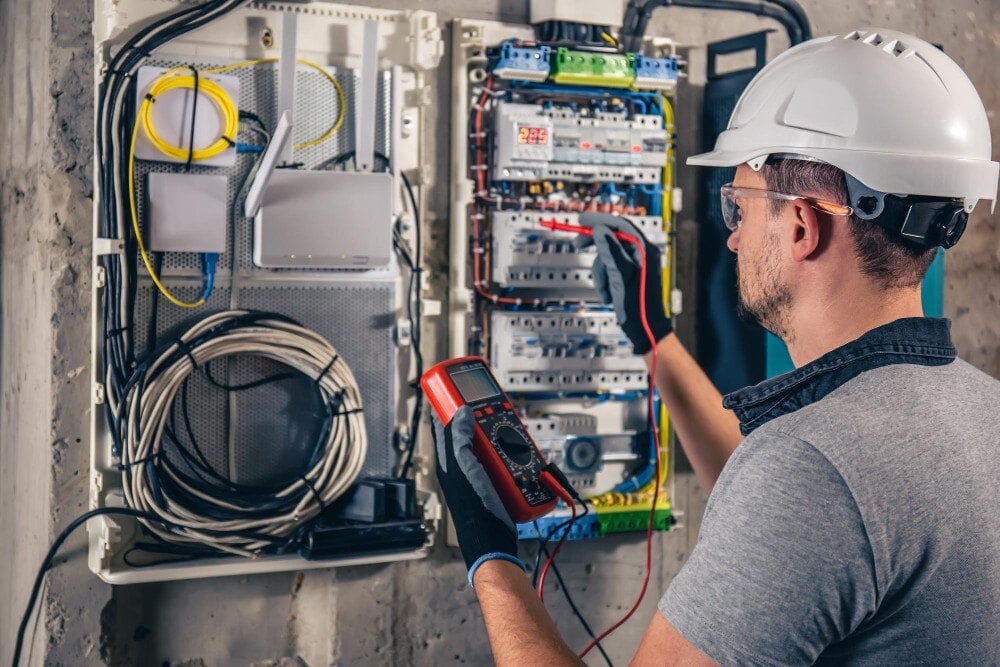How to Start a Contracting Business
Learn the 7 Steps for Creating a Small Business from Scratch
Do you work as a general contractor for a company or as a technician for a home-service business and you have ambitions to go out and start your own venture?
Maybe you’re already a sole proprietor earning income as a local construction worker, plumber, landscaper, window cleaner or home-renovation specialist and you want to turn your skills into a business.
With an explosion of more homeowners and building managers looking for services, starting a contracting business might be perfect for you.
You can be your own boss, generate revenue and scale your business to become the top provider in your town to finally live and work the way you want.
But starting a contracting business has its challenges. You probably already know how to do your job, but how do you turn it into a business? And what do you do next to grow the business?
It’s important to fully understand what it takes to run a successful contracting business and prepare yourself for what lies ahead.
This article will talk about what it takes to start a contracting business and what steps you need to take.
You will also find some tips for marketing your small contracting business and for how to start building your brand so you can get leads and revenue. So let’s get to it!
What Are the Challenges in Starting a Contracting Business?
Like it is for any small business, starting a new venture can be one of the most difficult undertakings of your life.
But with some elbow grease, the right help and the best sales and marketing tools, you can make the process easier.
Some of the challenges of starting a small business include coming to terms with your strengths and weaknesses, teaching yourself how to write a business plan and handling legal issues of which you were previously unaware.
To overcome many of these challenges, study the right resources and speak to the right people.
Seek legal counsel about incorporation, ask an accountant about which tax documents to prepare and absorb as many articles, books and small-business podcasts as you can to propel your journey of entrepreneurship.
After you’ve completed the initial steps, a lot of the hard work comes in getting your brand’s voice out into the world and actually gaining customers.
Don’t assume new business is going to fall on your lap. Create a website, set up your Google Business Profile to be found online, put aside some advertising costs and always provide amazing customer service to get customer reviews.
Starting your own contracting business can be one of the most rewarding feelings of your life. The journey is worth it!
How Much Does it Cost to Start a Contracting Business?
The costs of starting a contracting business can be intimidating for many, but with smart financial planning and perhaps a business loan, you can prepare yourself!
There are many factors to consider. For instance, how many employees you will need at first, your setup fees from legal and accounting, what your marketing budget will look like and so on.
And don’t forget about capital expenditures. For example, if you’re starting an HVAC business, you’ll need vehicles with truck wraps, tools, HVAC licenses and certifications, protective equipment and more.
Given all of the above variables, one cost estimate for starting a contracting business is $15,000–20,000 (and that’s just to cover initial setup expenses), assuming you won’t have salary expenses on day one nor that’ll you be buying a fancy new truck off the lot right away.
It’s not uncommon for small-business owners to seek investments in the early days of their company.
If you struggle to secure funding through traditional means, such as from your local bank, learn how to apply for an SBA 7(a) if you’re in the U.S.; it’s a government loan for those starting a small business.
7 Steps for Starting a Contractor Business
Starting a contracting business can get tricky if you’re not aware of what needs to be done. Here are some steps that will help you get started.
- Know Your Line of Work
- Create a Business Plan
- Register Your Contracting Business
- Familiarize Yourself with Industry Regulations
- Open a Bank Account
- Buy Insurance for Your Business
- List Your Contracting Business Online
1. Know Your Line of Work
The key to starting a successful contracting business is determining which services you’ll provide.
What your business does and what your area of expertise is or will be will define every aspect of your business.
Perhaps you’re already a technician or an employee at an existing company and this decision will be easy for you.
But if you’re looking to branch out and start a new thing, choose an area you already have knowledge and/or an interest in, whether it be repairing garage doors or remodelling kitchens.
However, if you’re unaware of where your expertise lies, you can do the following:
- Create an Excel sheet
- Divide the sheet into three different sections: expert, proficient and beginner
- Fill each list with interesting services according to your skills
While it’s essential to choose a service that you enjoy doing, it would also be beneficial to look at services that pay well and are high in demand.
Even if you already know what type of contracting service you’re going to build your business around, do market research of industry rates and local competitors to get an idea of what’s out there and what the size of the market is.
For example, the average plumber salary is $54,605 US per year while the average landscaper salary is $34,570 US per year.
This will help you estimate future profits, develop positioning strategies for your brand (what sets you apart?) and even discover market gaps (what’s vital that all competitors miss or don’t do?).
2. Create a Business Plan
A business plan can help you navigate the early problems that arise when you start a new business.
Here are some reasons why you should create a business plan for your contracting business:
- Testing the feasibility of your contracting business idea through market research
- To lay out your plans and your pitch to customers
- To forecast funding and hiring needs
A comprehensive and formal business plan might not be strictly necessary for some small businesses, especially if you don’t require funding or a loan.
But even in those instances, it’s helpful to sketch out the main elements of a business plan so that you have a guiding light. Consider a scaled-back version, known as a business-plan outline, in this scenario.
3. Register Your Contracting Business
Paperwork is perhaps the most tedious task for starting a contractor business. And when you’re registering your business with local governments, there certainly will be no shortage of bureaucratic paperwork.
However, here are some general steps and tips that will help you register your contracting business correctly:
- Most states will have directories for you to check if your business name is available. Have a backup name ready just in case the name of your choice is taken.
- Speak to a lawyer about what type of business entity will be best for you. A lawyer will help you determine if your business needs to be registered as a sole proprietorship, a limited liability company (LLC), a partnership or another legal entity. In general, most small contracting businesses start as sole proprietorships.
- If you plan to hire employees for your company, you will have to apply online for an Employer Identification Number (EIN).
4. Familiarize Yourself with Industry Regulations
In general, most industries are reasonably regulated. Before starting a contracting business, it’s vital to learn the rules and regulations of your chosen industry by federal, state and local authorities.
Depending on the regulations, you may have to apply for different licenses and permits. To avoid being on the wrong side of the law, you must get all the required permits for your business.
5. Open a Bank Account
For your business to function, you will need a bank account at every stage. From paying your bills and your employees to receiving your payments, everything needs a bank account.
Your local bank can help you with setting up a business bank account to start your contracting business.
6. Buy Insurance for Your Business
While getting your contracting business insured might be a significant expense initially, it’s a cost well worth paying if you consider the number of customers that might turn you down because you don’t have it.
With contractor liability insurance, you can protect your business and your employees from injury, legal costs and inadvertent damages to customer property.
This is especially valuable if you’re working in or on people’s homes.
Please consult a professional and tell them all about your business; they’ll guide you through all the necessary details. There are many private companies you can find online that sell business insurance.
7. List Your Contracting Business Online
To make your business visible, you have to get it listed. The popular platforms today are Google, Facebook, Instagram and LinkedIn.
For customer reviews to expose your brand to even more potential customers, also be sure to know about the best contractor review sites and sign up for the ones relevant for your business.
In your listings, include all the information that will help people find your business and learn about your services, such as:
- Business name
- Address
- Company Website
- Contact Information
- Products and Services
Tips For Growing Your Contractor Business
Now that we’ve got you covered with all the basics of starting a contractor business, let’s talk about some tips to help you grow it—or at least help you start getting your first few customers!
Be Your Own Accountant in the Beginning
Being your own accountant will not only save you money, but you’ll be able to better understand your expenses. This understanding of your company’s financials will help you plan better and make more informed decisions.
Later, once you become busy with more customers, you can hire an accountant or a bookkeeper.
Get Customer Reviews
It’s important not to underestimate the importance of customer reviews. especially if you’re a small business.
For example, a potential customer reads more than ten reviews on average before choosing a service provider.
Having positive reviews about your business helps potential customers learn more about your services and make a more informed decision. It also gives them peace of mind when trying to decide which local contractor to hire for a job.
Build Out an Advertising Plan
Unless you need to be extra frugal before you even earn your first dollar, once you have a few jobs under your belt, consider looking into local advertising services.
And we’re not talking about an advert in your town’s weekly newspaper, either.
There are lots of effective online options for small businesses, like Local Services by Google, which are great because you only pay for actual, qualified leads as opposed to simply anyone who happens to click on your ad, including by mistake.
Create a Website That Drives Leads
We already mentioned above that having a website is incredibly important to market your business. It’s necessary to show up on Google Search and to have a Google Business Listing.
Plus, think of all the people who quickly type into their phone “general contractor near me, “best plumber in <my town>” or “local hvac specialist.”
But gaining visibility from your website is only the first piece to the puzzle that is driving more sales. To close those sales, you need a compelling website that converts visitors into leads.
Make sure you build a lead-generation website to communicate your unique value propositions, show off your customer reviews and get visitors to contact you, request an estimate or book an appointment.
Start Your Contracting Business With Confidence and Grow Your Sales
Running a contracting business can be challenging, but we hope our guide will help you get started. The most important thing is not being afraid of starting small and just taking the first step towards having your own small business.
With some elbow grease and the right strategies, you can get customer reviews, have an amazing website and some awesome advertising campaigns to grow your revenue, hire more employees and dominate your town over the competition.




%20(1)-1.jpg)
